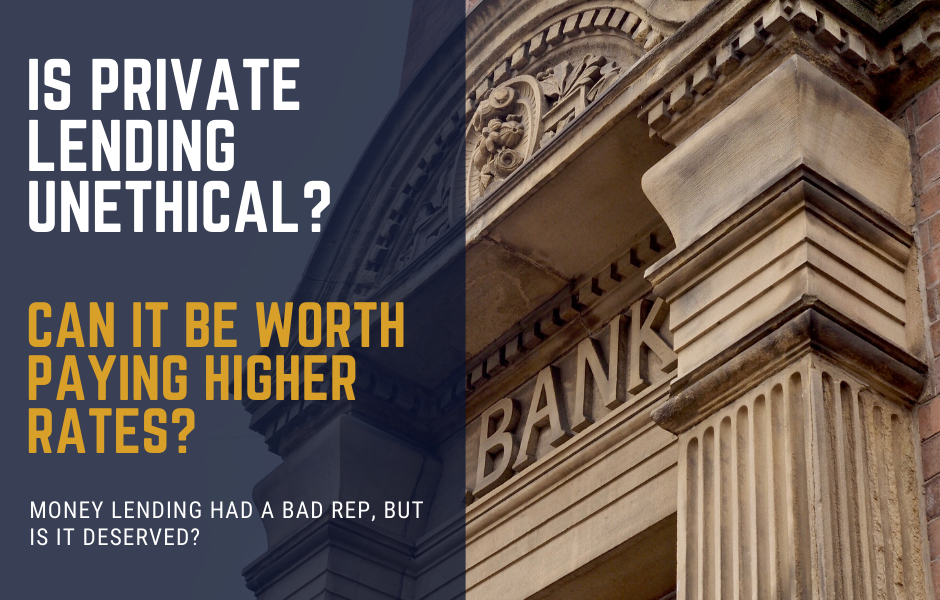Is Private Lending Bad or Unethical?

David Garner
Money lending in general can have a somewhat bad rep, but is it deserved? Private lending fulfills a critical function in the real estate market, so are private and hard money lenders really bad people? Read on to find out.
Contents:
- Why the Bad Reputation?
- Is Private and Hard Money a Rip Off?
- Will a Private Lender Steal My Property
- Why do People Use Private Money Loans?
- Code of Ethics
- How Private Lenders are Rebuilding America
Related Content: Private Lending 101 – A Complete Guide for Investors
Why The Bad Reputation?
Money lending is often stigmatized as predatory, and lenders as greedy. There is a lot of shame and guilt associated with both borrowing and lending money, and there are still lingering cultural stereotypes that perpetuate the image of the greedy money lender.
In real estate private and hard money lenders suffer far less regulatory oversight than traditional banks. This means they are far more flexible in the terms they can offer to borrowers. But it also means there is less policing of good practice, so occasionally the odd bad apple will bob to the surface.
There have been cases of hard and private money lenders taking advantage of naïve borrowers, or setting unrealistic terms that they know will result in the appropriation of the borrowers assets.
Since the explosion of social media over the last 10 to 15 years, has become awash with a swathe of chancers and ne’er-do-wells attempting to take advantage of unsuspected and inexperienced real estate investors. These scammers will usually try to charge thousands in upfront fees with no intention of ever lending and funds.
Related Content: Read This Essential Checklist BEFORE Lending Money to Real Estate Investors
Is Private Money and Hard Money a Rip Off?
One of the biggest reasons many people assume that private lending is bad, is the fact that private loans usually carry a much higher interest rate then traditional bank financing. It’s certainly true that private loans are more expensive, but that’s for good reason. The interest rate (among other things) reflects the risk that the lender feels they are taking by making the loan, and the work required in underwriting the deal.
But there are also other costs and fees associated with private money. Often a lender will add points to a loan. These are paid to the lender as a form of upfront interest when the loan closes. One point is equal to one percentage point of the loan amount.
Some lenders – especially hard money lenders – will also charge document preparation or underwriting fees. these set fees can run into thousands of dollars, and make borrowing small amounts of money impractical. If one is to borrow just $30,000 then costs and fees of $4,000 seems extortionate. But a loan of $100,000 might attract a similar upfront cost, making it much more viable.
So yes, private money loans and hard money loans are expensive, but they are still extremely useful and practical. I often work with private lenders when I am buying a house, especially when I need to close fast and use cash.
Related Content: A Guide to Credit Risk for Private Lenders
Will My Private Lender Steal My Property?
The short answer is, no. Lenders do not want to go through the hassle of foreclosing on, owning and selling your property. They want income. If a lender attempts to set you up to fail by offering terms that would be impossible to keep up, that is down to you as a borrower in accepting those terms.
It is also worth noting that in many States the foreclosure process is costly and takes a long time, so generally speaking lenders want to avoid that at all costs. It really is a last resort.
All that said, if you fail to meet your commitments under the terms of your promissory note your lender has the rights to take ownership of your property, just like any other bank.
Related Content: A Guide to Understanding Lien Position and Priority
Why do People Use Private Money and Hard Money Loans?
I’ve written about this a lot, and there are many reasons why a real estate investor or home buyer would use private money to close on a purchase. It could be down to the borrower, i.e. bad credit, poor debt to income ratio, no proof of income etc. Or, it could be down to the deal, i.e. a need to close fast with cash.
Whatever the reason an investor needs to use private money, I can tell you that if it was not available then a huge chunk of the real estate investments that happen on a daily basis just wouldn’t exist.
A Code of Ethics
Despite a lack of Federal or State oversight in the private lending space, there is a generally accepted standard of operating.
According to its website, the American Association of Private Lenders (AAPL) is a national organization that represents the private real estate lending sector. The AAPL has a code of ethics which provides a good guideline as to what a borrower should expect from a lender.
AAPL members voluntarily agree to abide by the following:
- Members will adhere to all laws with respect to services in which they are engaged including but not limited to: all lending, fund-raising, and loan servicing.
- Members will not discriminate against potential or actual borrowers based on their sex, age, race, sexual orientation, or religion.
- Members will be honest and forthright in all their dealings with their borrowers, investors, financiers, service providers, and the association.
- Members’ loan offering terms will not be changed from the original proposed terms without just cause. Members’ lending practices reflect their integrity and no “Bait & Switch” lending practices are tolerated.
- When originating a loan, it is our members’ desire to see the loan succeed and perform in accordance to the agreed upon terms. At no time will our members originate a loan based solely on the desire to see the recipient fail with the express intention of obtaining title to the property.
- Advertisements for products and services shall be truthful and will adhere to all laws, specifically defined through the Truth-in-Advertising Act under the FTC.
- All members will respect the intellectual property rights of others and will comply with applicable laws and regulations related to copyrights, trademarks, patents, and trade secrets.
- Members will conduct their business practices in a professional manner at all times.
While this code does not provide solutions to specific situations or problems, it does provide guidance to private lenders.
How Private Lenders Are Rebuilding America
For me, private lending has been a big enabler in deepening our impact in the communities we invest in. We buy bad houses in low to moderate income neighborhoods and turn them into good quality affordable homes. We wouldn’t be able to do that without our private lending partners.
Banks don’t want to lend against lower value property, and often we need cash to close fast, so private lenders are a perfect fit in this scenario.
Every house we buy is remodelled, and made available for purchase by a working family on our rent to own program. So, our private lenders are facilitating home ownership at the grass roots of the real estate market. Home ownership is the American Dream, it creates wealth, allows people to put down community roots and provides long term housing security for entire families.
So, are private lenders bad? No, in my experience they charge a fair price for a fair product, and if you do the deal right everyone benefits!
See Lending Opportunities: Join 5,000+ Investors in our Private Lending Portal to See Live Investor-Ready Lending Opportunities







